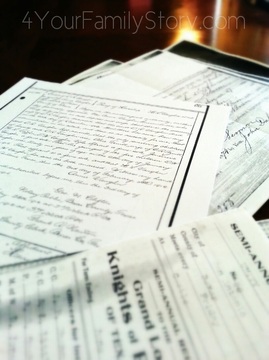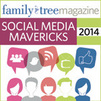 Have you ever made a mistake? Perhaps a typo in something you wrote? Maybe you put the wrong date on something? How about when you transcribe or abstract information from a document while doing genealogy or family history research? Of course you have. Everyone makes mistakes. It's a part of life. It's part of being human. So it stands to reason when you're looking at an index entry for your ancestor online that it just might be wrong. Or maybe when you pull down that book of will abstracts off the library shelf, that it, too, might have some errors. Maybe not all of it, but something in there might be wrong which makes it wrong-ish. Which is why those resources make great clues. And why they also need corroboration with some other clues before you can definitively say a certain statement is true or false. That's right. You're going to have to keep looking for more clues. Finding one clue doesn't mean stop. It means it's time to find more clues. And if you can find them and have access to them this is why looking at the original document {or digital copies of the original document} will be much more helpful to you. Double check that index entry in that online database or from that library book. Was it right? Was it wrong? Wrong-ish? Was there more information that you needed on the original document that was not on the index entry? How will you know for sure someone wasn't being human and made a mistake that profoundly affects the way you think about something and your research if you don't look for yourself? Further, I've found way more information that I needed for research on original documents than in indexes. Sure, I use the indexes to help me in my research. In fact, an index tells me there's an original document somewhere that I need to get my hands on. It's like a big red flag that indicates this came from somewhere else. But then? Make sure that document is correct. The more I research, the more I find original documents have mistakes too. 'Cause, you know, humans create those too. Imperfect humans. In fact, my own birth certificate had a typo in it. Then when I lost it {Yes, I lost it.} and ordered a copy of it, the clerk who typed it out did not make the same typo as the first one had, but made a different one. That's right. My birth certificate is still wrong-ish. {Interestingly, both typos involve my mother's maiden name. Their typing skills need some work. Definitely their editing skills could use some, you know, use.} Likewise, on my 2nd great grandfather's death certificate, his last name is misspelled just a bit, his death date is listed as his birth date, his parent's names are misspelled just a bit, and his parent's places of birth are wrong. So. Good thing I ordered that microfilm roll that contained his baptismal record in it and his mother's death record. {Yeah, that wasn't online.} And good thing I ordered his Civil War pension record. {Nope. Not online either.} And it's also a pretty good thing I found his father's baptismal record. {That was online.} Plus, all those census records I found came in pretty handy for all sorts of corroboration. {All online.} And then finding my 2nd great grandmother's Proof of Heirship public affidavit in land records stating he died on such-n-such date without a will was kinda handy too. {She also listed all their living children -- his heirs -- and their spouses. Digital copies all online and for free.} And then his Knights of Pythias (fraternal order) records {Not online. At all.} were nice too because they corroborated his membership and death date. {By the way, the fraternal order clue came from his death certificate.} And that's how I knew his death certificate, though official and created at the time of his death, was, you know, wrong-ish. Those humans had made mistakes when they filled out his death certificate just like those humans had made mistakes when they filled out my birth certificate -- both times. {Will the 3rd time be a charm? Will they look over their work to see if it's correct? I'll let you know.} But? The 3 things that will profoundly affect your family history research? The 3 things that can break-down that genealogy research brick wall?
~Caroline
14 Comments
6/13/2013 04:15:00 am
Oh yes, my father was astonished when I told him all records can lie! I actually ordered a marriage record from the record office in England and found a digital copy online on Find My Past. Same marriage, two repositories, and they both were almost completely different besides the names, date and place. It was pretty wild, but a great initiation for my Dad who didn't have any clue it could be that different.
Reply
Caroline Pointer
6/13/2013 10:45:57 pm
Kathleen,
Reply
6/14/2013 12:06:09 pm
I'm not sure when I stopped trusting records, but it had to be once I started researching my family history. It was great fun with Dad because he's not super interested. I like to find fun ways to display the information. Once he wanted to prove me wrong so he wanted to see his birth certificate because surely, that was 100% correct. Well, turns out his father's middle name was on there wrong. So he called all his sisters to compare and they all had something different! Now I get a little more sympathy when I complain about being confused! Excellent post - I love it, particularly the little asides! I remember being floored when I found out a textbook in high school was wrong-wrong-wrong... Bbbbut it's in PRINT, I said horror-struck, it's got to be right. Oh well - we learn, eh? Thanks for such a helpful post.
Reply
Caroline Pointer
6/18/2013 03:55:57 am
Thanks, Celia! Textbooks are usually written based on secondary information and not primary information -- and to find that out is a real eye-opener. And that's not even considering all the bias that exists in textbooks.
Reply
Great post! And, I've had a similar experience with a birth certificate for one of our sons. The human who filled in the "mom's maiden name" field on his birth certificate put my occupation instead. Huh?
Reply
6/20/2013 11:49:43 am
Caroline, You are so right. It is absolutely necessary to find a collection of original documents that reinforce each other if you want to close in on "fact" or "truth." And even then . . . pretty much nothing is 100%.
Reply
Caroline Pointer
10/5/2013 07:35:57 am
Mariann, everything you listed is SO very true! And you are very welcome for your note and book. Thank YOU so very much for reading and your support. I appreciate it! =)
Reply
4/9/2014 12:22:03 pm
Great post. And, oh so true. I won't go into all the incorrect records I have seen, but, like you said, they are many.
Reply
Caroline
5/22/2016 01:02:44 pm
Hi Diane,
Reply
Nada A Reed
9/25/2015 09:31:15 am
Yes the one place I find the most obvious error is on a tomb stone. My Grandfather (Mum's Dad) his dod was wrong by three years. I knew they ordered his stone well after his death. I found three other documents to prove proper date. Along with a picture of the gathering. My Mum would be so grateful for that little plaque of a date. One small thing I can do for a wonderful Man I have not met yet.
Reply
Caroline
5/22/2016 01:06:04 pm
Hi Nada,
Reply
Lynnet Brooks
9/26/2015 01:08:38 pm
Some of the things that I have learned over the years of research is that 1st hand information SHOULD be the most accurate, legible handwriting is VERY important, and many early records were written phonetically (or F-O-N-E-T-I-K-L-E!) since many ancestors were not educated in reading and writing skills and some could not even write their own names.
Reply
Caroline
5/22/2016 01:07:13 pm
Hi Lynnet,
Reply
Leave a Reply. |
Categories
All
Archives
February 2017
|
|
© Copyright For Your Family Story 2016 - All Rights Reserved
|

